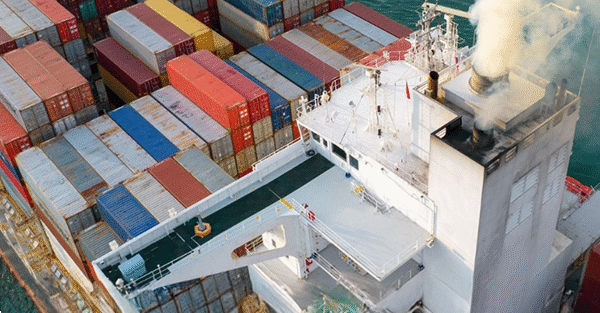Charting a Greener Course: Innovations Driving Sustainable Shipping in 2025
Navigating a Cleaner Future for Global Shipping
As environmental awareness grows across the maritime world, sustainability has become a defining factor in the future of global trade. At Good Face Marine, we believe that operational excellence and environmental responsibility must go hand in hand. The shipping industry responsible for nearly 3% of global greenhouse gas emissions now faces a crucial challenge: transforming traditional logistics into a cleaner, smarter, and more efficient ecosystem.
In this article, we explore the best practices for green shipping, the real impact of maritime operations on the environment, and how ports and companies can lead the transition toward a more sustainable future.
What Is Eco-Friendly Shipping?
Eco-friendly or “green” shipping refers to minimizing the environmental footprint of maritime operations through improved fuel efficiency, reduced emissions, and the use of sustainable materials. This involves every aspect of the supply chain from packaging and logistics management to port operations and ship maintenance.
Sustainable shipping practices help reduce waste, lower CO₂ emissions, and conserve marine ecosystems, ensuring that global trade continues to thrive without compromising the planet.
The Global Environmental Impact of Shipping
Shipping remains the backbone of international trade, moving around 90% of global goods. However, it also contributes significantly to carbon emissions, air pollution, and marine waste.
Studies show that black carbon emissions from vessels burning heavy fuel oil are among the top contributors to global warming. Additionally, inefficient logistics and packaging waste add to the industry’s environmental burden.
At Good Face Marine, our sustainability strategy focuses on reducing these emissions through optimized vessel provisioning, smarter port operations, and greener supply solutions.
9 Best Practices for Greener Maritime Operations
- Adopt Eco-Friendly Packaging & Supplies
Use recyclable and biodegradable packaging materials to reduce marine pollution. Whether for ship stores, provisions, or spare parts, switching to sustainable packaging helps eliminate single-use plastics from the supply chain.
- Reduce Energy Consumption Across Operations
Implement energy-saving measures in port logistics, warehousing, and onboard systems. This includes using LED lighting, solar-assisted systems, and fuel-efficient generators.
- Choose Low-Emission Transport Options
When possible, rely on ground and sea transport instead of air freight, which significantly cuts carbon emissions. Efficient route planning and cargo consolidation also reduce unnecessary fuel use.
- Support Carbon Offsetting Initiatives
Offsetting carbon emissions through verified environmental projects helps balance the impact of necessary maritime operations. Companies can invest in coastal restoration or renewable energy projects to achieve partial carbon neutrality.
- Optimize Ship Routing and Speed
Smart navigation systems can calculate the most fuel-efficient routes, avoiding bad weather and congested waters. Even small speed reductions known as “slow steaming” can dramatically reduce fuel consumption.
- Use Environmentally Friendly Lubricants and Paints
Eco-certified lubricants and anti-fouling paints help protect marine ecosystems from harmful chemicals, contributing to cleaner oceans and more sustainable vessel maintenance practices.
- Encourage Waste Segregation and Recycling Onboard
Ships should implement solid and liquid waste management systems to handle recyclables, minimize discharge, and ensure safe disposal in compliance with MARPOL standards.
- Invest in Digitalization and Smart Logistics
Digital platforms and automated systems enhance efficiency, reducing delays and fuel waste. By embracing digital transformation, operators can monitor emissions, plan maintenance schedules, and optimize fleet performance.
- Collaborate with Green-Minded Partners
Sustainability is a shared mission. Partnering with suppliers and logistics providers who share the same environmental goals helps create a fully integrated, green supply chain — from port to vessel.
The Benefits of Green Shipping
Adopting sustainable shipping practices doesn’t just help the environment — it also creates real business value:
- Operational Efficiency: Lower fuel costs, optimized routing, and reduced waste.
- Regulatory Compliance: Alignment with IMO 2030 and 2050 carbon reduction goals.
- Enhanced Brand Reputation: Customers and partners increasingly favor eco-conscious companies.
- Long-Term Profitability: Efficient operations lead to reduced costs and greater resilience.
At Good Face Marine, our ongoing initiatives support clients in integrating sustainability into every step of their maritime operations from eco-provisioning and waste management to energy-efficient port logistics.
Leading the Way in Green Maritime Services
With full Egyptian port coverage and a commitment to environmental stewardship, Good Face Marine is working to make sustainable operations accessible and effective for every shipowner, charterer, and maritime company we serve.
By choosing eco-friendly practices today, we secure a cleaner, more prosperous maritime future for generations to come.





